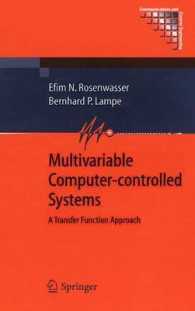- ホーム
- > 洋書
- > 英文書
- > Science / Mathematics
Full Description
This book is dedicated to Professor Leonid V Keldysh. His brilliant contributions to condensed matter physics include the Franz-Keldysh effect, an electron-hole liquid, the nonequilibrium (Keldysh) diagram technique, Bose-Einstein condensation (of excitons) and a ``metal-dielectric'' transition, acoustically-induced superlattices, multi-photon transitions and impact ionization in solids. In many respects, his work influenced and formed the paradigm of modern condensed matter physics. As a result, many famous researchers in the field have enthusiastically provided unique contributions to the book.
Contents
0. Preface ; 1. Recollections ; 2. Once again on the "Physical Minimum" ; 3. Hybrid Organic-Inorganic Nanostructures and Light-Matter Interaction ; 4. The acoustic-wave driven quantum processor ; 5. On the problem of many-body localization ; 6. Raman scattering by LO phonons in semiconductors: the role of the Franz-Keldysh effect ; 7. Phenomena in cold exciton gases: from theory to experiments ; 8. Composite Fermions and Fractional Quantum Hall effect in two-dimensional electron system ; 9. Microcavities with quantum dots: weak and strong coupling regimes ; 10. Dynamics of cold excitons and electron-hole ensembles in direct-gap semiconductors studied by mid-infrared pump and probe spectroscopy ; 11. Exciton Coherence ; 12. Inelastic Light Scattering by Low-lying Excitations of Quantum Hall Fluids ; 13. Remarks on Surface-atoms Forces in London and Lifshitz Limits ; 14. Modern trends in semiconductor spintronics ; 15. Excitonic insulators, electron-hole liquids and metal-insulator transitions ; 16. Electron-hole liquid in semiconductors ; 17. Collective state of interwell excitons in double quantum wells heterostructures ; 18. Bose-Einstein condensation of excitons: Promise and disappointment ; 19. Acoustically induced superlattices: from photons and electrons to excitons and polaritons ; 20. Inelastic tunneling spectroscopy of single surface adsorbed molecules








